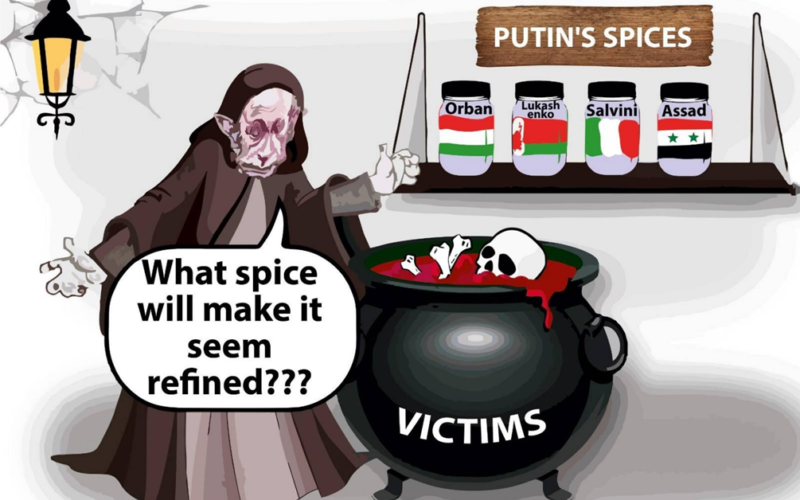For decades, Russia has been breeding and inserting its minions into the establishment of many countries across the globe. Typically, such valuable assets are used sparingly and only when critically important and in times of great need. The time has come in recent years, especially in the aftermath of the Russian full-scale invasion of Ukraine.
Sanctions, battlefield defeats, and the transformation of Russia from a former geopolitical player into an outsider and outcast have resulted in the activation of Russian puppets worldwide, particularly for politics in Europe.
Radicals, Kremlin minions, are vying for power in Europe
Various far-right and far-left parties, still on the fringes, are sympathetic to the Russian aggressor, amplifying the Kremlin’s message with the help of at times obscure sources close to “gentlemen with bad manners but a mysterious soul.”
In some European countries, such as France, Italy, Austria, and Germany, these new minions have been trying to win positions of power, while in other ones, like Hungary, they have formed the government.
The greatest danger of such governments is not in playing along with Russia (despite voters’ interest) but rather in attempting to taking power at any cost, particularly at the expense of other people’s life, liberty and prosperity. These puppets have been inventing new “unholy enemies” for their crusades so that the voters’ attention is diverted away from pressing issues and toward the fight against individuals who oppose their message.
In this article, we will examine causal relationships in the emergence of an authoritarian government from seemingly democratic and progressive political platforms when they long nostalgically for certain “better times” and promote “homeopathic” solutions to problems.
Consider Belarus, which Condoleezza Rice described famously as “Europe’s last true dictatorship.” And let us remember modern countries that slowly but steadily found themselves at a crossroads to make a critical decision about their future development. But no one looks at Belarus somehow.

Parallels between Lukashenko and Mussolini
Belarusian President Lukashenko is remarkably similar to Mussolini. Lukashenko founded the Party of People’s Agreement in 1991 with the goal of promoting unity for the sake of order. Mussolini also wanted the government to encourage unity and agreement, especially among employees and employers, thereby eliminating strikes.
Aged 39 in 1994, Lukashenko was elected president, pledging to restore order after the Soviet Union collapsed. His rhetoric was reminiscent of Mussolini’s who also became Prime Minister at 39.
Lukashenko criticized Yeltsin’s Russia in the same way that Mussolini criticized the Weimar Republic. A few years later, he welcomed Putin in the same way that Mussolini welcomed Hitler, even though Putin looked down on Belarusians and considered them inferior in the same way that Hitler looked down on Italians.
Lukashenko restored order because he desired to consolidate power. He was named Batka, and Mussolini was named Duce, the terms are very similar.
Lukashenko prevented local enterprises from flourishing by putting everything under state control. As Lukashenko boasted, Belarus’ economy reaped non-market gains from cooperation with Russia. He paid in terms of sovereignty. This is also reminiscent of Italy in the 1930s.
After Russia attacked Ukraine in 2014, Lukashenko started to drag Belarus into the conflict between the nations. Although he was not re-elected in 2020, he falsified the election and attained dictatorial power with Putin’s assistance. In 1943, Hitler also installed Mussolini.
There are some Italians who view the Duce as a role model rather than as a historical fact. On Mussolini’s birthday in 2018, Interior Minister Salvini rephrased his well-known adage as “many enemies, much honor” in a tweet. Other politicians who are skeptical about Belarus but romanticize Mussolini.
China is perceived positively by all right-wingers as a counterweight to the US and perhaps stronger countries in Europe, i.e., Germany, France, and the UK.
The morale of Mussolini’s story is not only instructive for the right-wingers. Mussolini defeated the Italian left-wing populists after World War One because they were destroying the nation. In many ways, what they were doing was similar to what the populist bloggers from the Five Stars party are currently doing.
Fighting corruption and boosting people’s well-being are the key lures in modern populists’ armory of promises
New faces, autocrats, anti-corruption activists, and traditionalists all talk smoothly about urgent issues and suggest solutions. When evaluating the plausibility of political promises, it is important to consider various factors, including economic and historical ones.
The available resources — financial, infrastructure, and human as well as prospective political and economic alliances — determine the economic wellbeing in particular. GDP, inflation, unemployment, energy prices, the export-to-import ratio, the average wages, and the cost of a consumer’s basket are all relevant. It is also about establishing commercial ties with other nations and how that would impact the country’s political landscape.
The impact of Russia on Belarus’ political system is a vivid illustration of how the economy affects politics. Russia’s ongoing economic assistance to Belarus supports the Lukashenko government and quashes all democratic aspirations of the Belarusian people.
History is about learning from centuries of experience of own country and other countries. Compared to the rapid changes in business, science, and technology, socio-cultural relations have not been changing as quickly. Naturally, subconscious-reflexive reactions to events continue to shape psychology of the general public, which opens up a wide range of possibilities for manipulation. Modern politicians apply tactics to evoke fear, distrust, prejudice, and doubt, as these have always been the primary response in human history.
Modern history abounds with examples where the reliance on emotions and religious beliefs without a proper understanding of the complexities of socioeconomic development results in decline or stalemate. That’s the experience of countries like Cuba, Venezuela, Zimbabwe, Argentina, Syria, and Belarus.
Power corrupts the rulers
Alexander Lukashenko, a former border guards serviceman, Communist Youth organization leader, and a state farm deputy head, came to power in Belarus after the collapse of the Soviet Union. He was a “promising business-minded executive,” a communist with a conviction for democratic reform, and he dreamed of restoring the “reformed” USSR.
The country’s economic crisis was ended when yesterday’s “communist for democracy,” who had just got power, started to restore order. However, Belarusians’ political and civil liberties had to be sacrificed as the price. Evidence suggests that Lukashenko used physical force against his political opponents. Economic stability came at the cost of cultural unity with Russia.
In 1995, Lukashenko initiated a national referendum on various issues, including awarding the Russian language the official status, which resulted in the Russian language getting this status. So started the dictatorship that is 27 years old now.
Why to talk about history of dictatorships?
Nations around the world faced many difficulties in the past ten years, including the massive influx of refugees into Europe following the Syrian conflict, Brexit, the two-year coronavirus pandemic, and the start of Russia’s full-scale war against Ukraine. All of these things are affecting the economies of many countries now, and this which makes people feel uncertain about the future.
Time and again politicians’ populist pledges open up opportunities to reach wider audiences. Europe, a continent with rich documented history and wisdom, has been hit by the virus of expectation of quick and easy remedies at present time. Euroscepticism is spreading across Europe, heralding the arrival of profound changes.
Candidates for office or incumbents are increasingly emphasizing the return to traditions, imposition of regulations by the EU that benefits just a small number of countries, and the necessity to return to the “proper” way of life in order to preserve, first and foremost, their own interests.
Populists say: “We are the ones who will take you to the better life you deserve”
The upcoming Italian parliamentary elections have brought up important issues for both the EU and the Italian society. In their platforms, politicians of the “new era” advocate for the welfare of common citizens and a return to traditional values.
The struggle against everything “evil” and for everything “good,” as well as against “strangers” and for “our own,” is frequently mentioned by the candidates for office. This trend is becoming a reality in other EU countries too even when they used to praise moderation and critical thinking.
The Italian society is faced with a test on September 25, 2022, the election day. In Italy’s usually vibrant political landscape, parties across the spectrum, far-right, right, and center-left, propose their remedies to the economic and political crisis. They all support Italy’s well-being and global leadership.
But can history repeat itself in Italy that plagued Belarus 28 years ago?
It is a resounding no! Belarus paid a steep price for Russian economic support. It gave up language and consequently, independence. This was feasible because of the two countries’ proximity, shared history within the USSR, and an earlier Russian language dominance in Belarus.
Italy ain’t Belarus. Italians have no need to fear losing their culture and language in exchange for less pricey cubic meters of Russian gas.
However, independence may be lost gradually, the record of the powerful Duce attests to that. The “good” intentions of “patriots,” especially those whose promises mask the desire for power at all costs, can be the agents of a gradual loss of Italy’s status of a world leader.
Five steps from populist to dictator, and five stages of acceptance of authoritarianism
At first, power consolidation boosts the country’s economy and living conditions, and safeguards population. Then comes the battle against those who stand in the way of this dream — strangers, old elites, or loyal companions. The next step is to control the media in order to alter voters’ perception of reality. Fourth, to tailor the constitution to the own liking. The ultimate step is be ready to sell off national interest to keep power.
After 25 years in power, dictator Lukashenko stated the following: “My entire life has been like a squirrel in a wheel (and that of other presidents, I believe). You stand up, spin around, and run. How are you able to run for 25 years? You got used to it. Where to go? The wheel is spinning. The wheel will spin and throw you if you don’t move. This is the way of life. You are used to it already “. Indeed, the leader’s addiction to power can lead to the decline of the entire country.
According to international organizations’ rankings of democratic freedoms, Belarus ranks among the top countries from the lowest to the top. There are no free elections, free speech rights, or political opposition in the government. It didn’t happen overnight, but we all know what decision laid the groundwork for it.
What course will the new Italian government take?
Opinion polls predict what percentages the leading parties will gain on September 25. The issue is, can they draw lessons from history?
Will the newly elected Italian administration follow the example of the Orban-led government in Hungary who hasn’t followed the path of Lukashenko because of checks and balances that include EU systems. Otherwise, Hungary would be embraced by Putin’s arms and get fossil fuels at a low price. It is the EU that doesn’t allow the Hungarian strongman to throw his country on this path and enter into a confrontation with the rest of the civilized world.
Whatever the Italian coalition is, partnership with the EU and NATO, particularly in confronting military aggression against Ukraine will keep Italy on its path of global leadership and admiration. Italy’s economic, military and political strengths depend on its government’s choice to be on the side of democratic countries. Furthermore, it will allow Italy to maintain democracy and a free civil society while keeping dictators wanna-be at bay.








